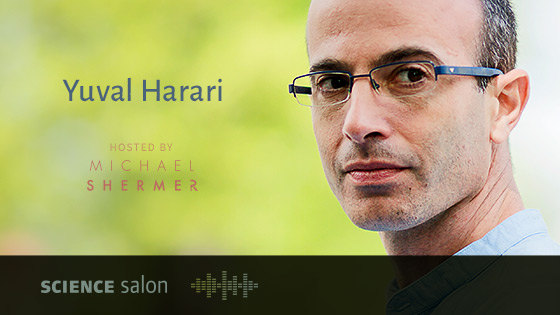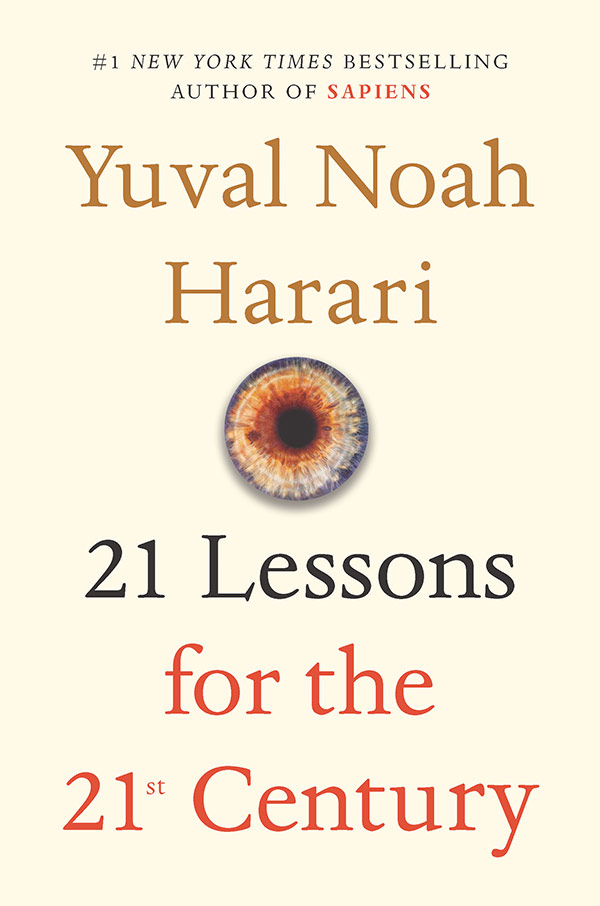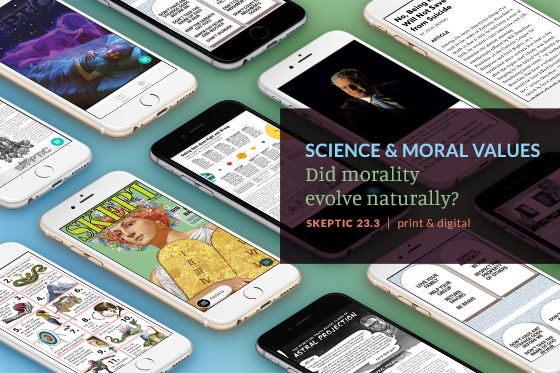SCIENCE SALON # 38
Dr. Yuval Noah Harari — 21 Lessons for the 21st Century
In this dialogue with one of the most interesting minds of our time, the Hebrew University historian and best-selling author (Sapiens, Homo Deus), Dr. Yuval Noah Harari, he and Dr. Shermer discuss the central ideas of his new book, 21 Lessons for the 21st Century, an exploration of: history, work, liberty, equality, community, civilization, nationalism, religion, immigration, terrorism, war, humility, God, secularism, ignorance, justice, post-truth, science fiction, education, meaning, and meditation. Dr. Harari and Dr. Shermer cover as many of these topics as reasonable in this wide-ranging conversation, focusing especially on nationalism, tribalism, God and religion, free will and determinism, AI algorithms and human volition, the future of liberal democracy, colonizing Mars, and much more.
Dr. Yuval Noah Harari has a Ph.D. in history from the University of Oxford, and now lectures at the Hebrew University of Jerusalem, specializing in world history. His two books, Sapiens: A Brief History of Humankind and Homo Deus: A Brief History of Tomorrow, have become global bestsellers, with more than twelve million copies sold and translations in more than forty-five languages.
Listen to the podcast via Apple Podcasts, Spotify, Google Podcasts, Stitcher, iHeartRadio, and TuneIn.
This remote Science Salon was recorded in audio format only on August 19, 2018.
Check Us Out On YouTube.
Science Salons • Michael Shermer
Skeptic Presents • All Videos
If you enjoy the video, audio, and written content we produce, please show your support by making a donation. Your ongoing patronage is vital to our organization’s mission to promote science and critical thinking.
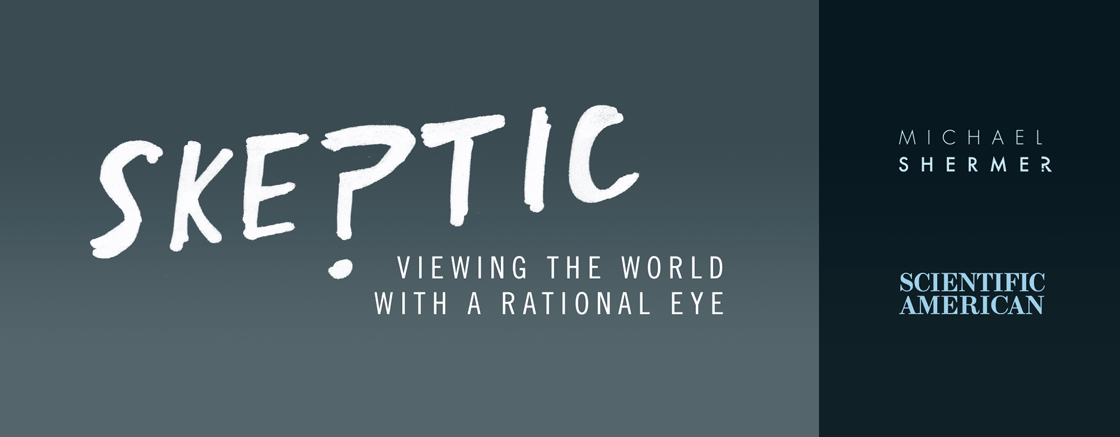
MICHAEL SHERMER’S “SKEPTIC” COLUMN IN SCIENTIFIC AMERICAN
Abortion Facts: Education and birth control are slowly making the politics less relevant
In May of this year the pro-life/pro-choice controversy leapt back into headlines when Ireland overwhelmingly approved a referendum to end its constitutional ban on abortion. Around the same time, the Trump administration proposed that Title X federal funding be withheld from abortion clinics as a tactic to reduce the practice, a strategy similar to that of Texas and other states to shut down clinics by burying them in an avalanche of regulations, which the U.S. Supreme Court struck down in 2016 as an undue burden on women for a constitutionally guaranteed right. If the goal is to attenuate abortions, a better strategy is to reduce unwanted pregnancies. Two methods have been proposed: abstinence and birth control.
Abstinence would obviate abortions just as starvation would forestall obesity. There is a reason no one has proposed chastity as a solution to overpopulation. Sexual asceticism doesn’t work, because physical desire is nearly as fundamental as food to our survival and flourishing. A 2008 study published in the Journal of Adolescent Health entitled “Abstinence-Only and Comprehensive Sex Education and the Initiation of Sexual Activity and Teen Pregnancy” found that among American adolescents ages 15 to 19, “abstinence-only education did not reduce the likelihood of engaging in vaginal intercourse” and that “adolescents who received comprehensive sex education had a lower risk of pregnancy than adolescents who received abstinence-only or no sex education.” A 2011 PLOS ONE paper analyzing “Abstinence-Only Education and Teen Pregnancy Rates” in 48 U.S. states concluded that “increasing emphasis on abstinence education is positively correlated with teenage pregnancy and birth rates,” controlling for socioeconomic status, educational attainment and ethnicity. […]
Follow Michael Shermer on
Twitter • Facebook • Blog • YouTube
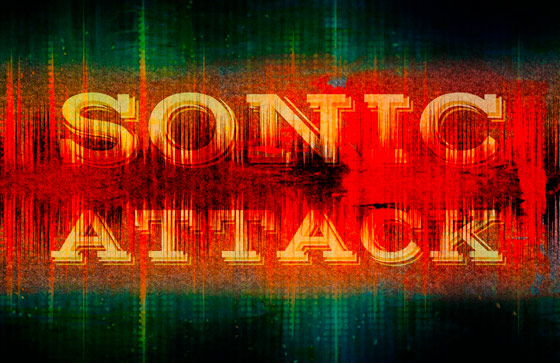
As reports of mysterious “sonic attacks” continue, Robert Bartholomew examines the flaws in a study that was published in the prestigious Journal of the American Medical Association (JAMA) by a team of neurologists who examined American Diplomats who believe they were victims of such attacks last year in Havana, Cuba.
Reports of Mysterious Attacks on U.S. Diplomats Continue
Separating Fact from Fiction
It is the case that just won’t go away. Controversy continues to swirl around the cause of several outbreaks of mysterious ailments among American diplomatic staff that are widely believed to be from an acoustical weapon. The story first broke in August 2017, when the State Department announced that since late 2016, 22 employees of the American Embassy in Havana, Cuba, had been stricken. Before long, two more victims came forward. Since we first reported on this episode (Skeptic, 2018, 23/1:13–15), a 25th staffer has been added to the casualty list. Most victims reported hearing strange sounds accompanying their symptoms that were variously described as buzzing, humming, and grinding. Complaints included fatigue, dizziness and difficulty concentrating, confusion, headaches, nausea, and more alarmingly, changes to the white matter tracts of the brain and concussion-like symptoms.
Throughout 2017, dozens of American citizens have reported that over the past few years, they had experienced similar symptoms after hearing strange sounds while spending time in one of the two Cuban hotels where many of the attacks allegedly occurred. They claimed that in September 2017, an officer attached to the American embassy in Tashkent, Uzbekistan, reported that he and his wife had experienced similar symptoms after hearing strange noises. By mid-2018, the State Department dispatched a medical team to China after announcing that several diplomatic staff there had fallen ill after hearing similar sounds.
The most significant development in the mystery took place on February 15th of this year when the prestigious Journal of the American Medical Association (JAMA) published a study from a team of neurologists who examined 21 of the Cuban victims. They concluded that embassy personnel were indeed suffering from concussion-like symptoms and white matter tract changes.1 They also dismissed claims that it was a case of mass psychogenic illness. Their findings made global headlines. But here is where the story takes a surprising twist: for a study published in one of the world’s leading medical journals, it was remarkably flawed. The authors made startling claims that were not supported by their own evidence. Let’s examine these claims. […]


